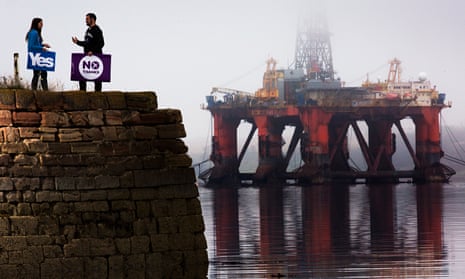In the coming hours, a hush will descend on Scotland. After these final weeks of loud, full-throated argument, the culmination of a two-year campaign, there comes the special quiet of the polling booth. In silence, millions of voters in Scotland will make their choice, a simple yes or no to a profound question: Should Scotland be an independent country?
While that happens, those inside and outside of Scotland can pause – and give a cheer for what we have witnessed. It has been a campaign without parallel on these islands, a genuine national conversation that has reached the smallest town and the most remote rural community. The argument has been conducted in packed public meetings but also in pubs and across kitchen tables. Civic engagement sounds like a dry abstraction, but it has been made real and visible in Scotland. It is something to be really celebrated.
That is not to deny that sometimes the debate has deteriorated into abuse, with intimidation particularly visible on the yes side. But the worst excesses have been committed on the fringes, especially online, or by leadership figures who should know better. It would be wrong to condemn an entire movement, with deep roots and made up of ordinary citizens, for the actions of those few. Besides, it is hardly a surprise if such a debate has not remained genteel throughout. The stakes here could not be higher: the fate of a nation, of several nations, is on the ballot paper. Emotions were always going to run high and deep.
But here too is something to celebrate. One only need look around the world and through the history books to know that this is not the usual way disputes of this kind are resolved. Dissolving a union is, all too often, the stuff of war and violence. But tomorrow Scotland will settle this momentous matter peacefully, through a vote and without a shot being fired. That should not be taken for granted. It is the exception not the rule – and something at least a few peoples, watching from afar, will envy.
What, though, of the choice itself? It is stirring to watch a nation, an ancient nation, longing to determine its own future. Some grow uncomfortable at such talk, imagining that once the nationalist genie is out of the bottle, its chauvinist cousin cannot be far behind. But that need not be the case. The desire to bring power closer to home, and scepticism about the Westminster parties’ hurried pledge to deliver it, is something we understand. The hunger for the collective self-respect that comes with independence rather than mere devolution cannot be dismissed either.
And yet, as we have already argued, if this newspaper had a vote, we would vote no. The yes case has been, as Scottish law might put it, not proven. The implications have not been worked through, the risks not fully addressed. What’s more, a decision of such gravity – to break away from a 300-year-old union – should be the settled will of a nation. The very fact that Scottish opinion is so closely divided is itself a weakness in the case for independence. Moves of such import should command enduring and overwhelming support, as the creation of the Holyrood parliament did in 1997. Above all, the Guardian retains its belief in solidarity, in a world of fewer rather than more borders and in the union itself – as the best method of sharing the rewards and risks of our collective life together on what is still a small island.
Some have seen no as the dull, safe choice. But it could be something very different: the beginning of a new joint enterprise for the four nations of the UK, the chance to reforge our union – to spread power, to break the paralysis and centralisation of Westminster, to fix a system that is broken. That is an exciting project for the 21st century, long overdue. It is tomorrow’s referendum which has created that chance. It might well represent yet another gift of the Scottish nation to the people of Britain – one for which we give enthusiastic thanks.
